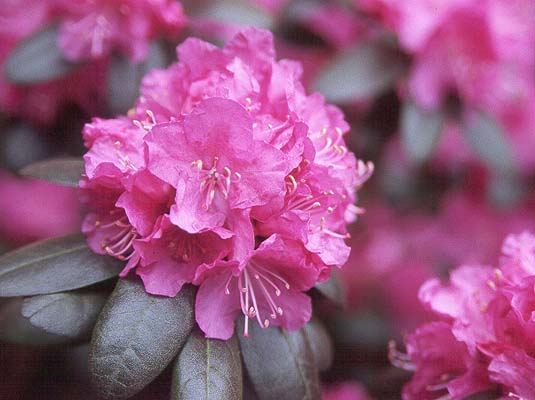

PJM rhododendrons are a group of hybrid, broadleaf evergreen shrubs in the Ericaceae (blueberry) family that were developed by Peter J. Mezitt and his son in the 1930s to be exceptionally winter hardy. The genus name derives from the Greek words rhodo, which means rose, and dendron, meaning tree.
Growing 3 to 6 feet tall and wide, these rhododendrons prefer partial shade and protection from strong winds. They grow well in moist, acidic soils but do not like wet feet. If you have clay soil, amend it with organic material and plant the root ball high in the soil to help with drainage issues. Avoid overwatering and over-fertilizing. Pruning, if desired, may be done after flowering. This plant is resistant to browsing by rabbits.
As with all members of the genus, PJM rhododendrons are perfect as mass plantings in woodland or natural areas and specimens in pollinator gardens. Their green foliage acquires purple tones in winter, making them a wonderful addition to a winter garden. They also make a great informal hedge plant.
| Requirement | |
|---|---|
| Hardiness | 4,5,6,7,8 |
| Heat Zones | 1,2,3,4,5,6,7,8 |
| Climate Zones | 4, 5, 6, 7, 16, 17, 18 |
| Plant Type | Shrubs |
| Plant Family | Ericaceae |
| Exposure | Partial Sun |
| Season of Interest | Spring, Fall, Winter, Mid Spring, Late Spring |
| Height | 5' - 6' |
| Spread | 5' - 6' |
| Water Needs | Average |
| Maintenance | Low |
| Soil Type | Clay, Loam, Sand |
| Characteristics | Attracts Butterflies, Attracts Hummingbirds |
| Garden Styles | City and Courtyard, Informal and Cottage, Traditional Garden |
| Planting Place | Beds and Borders, Hedges and Screens |